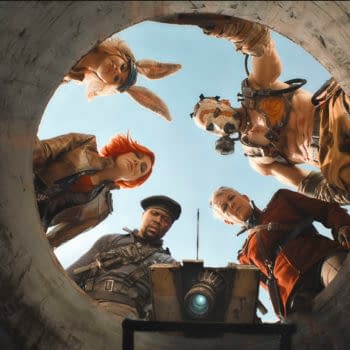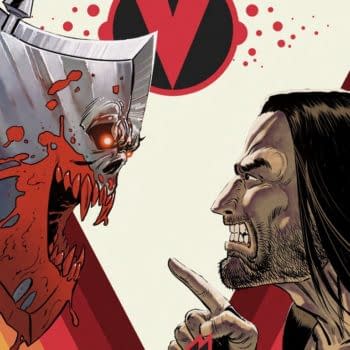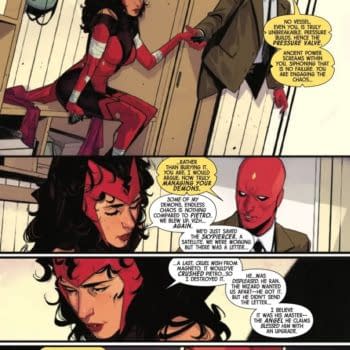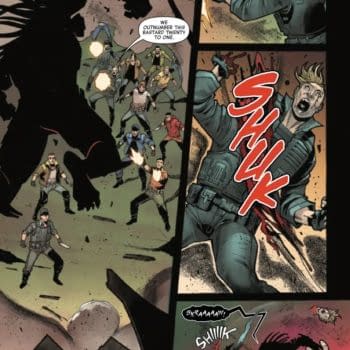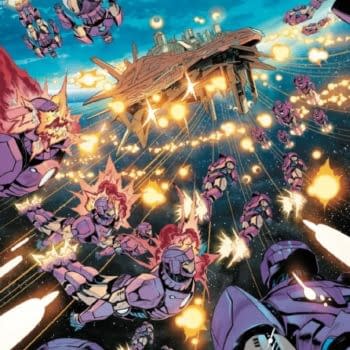Posted in: Comics | Tagged: annihilator, Comics, entertainment, frazer irving, grant morrison, legendary, san diego comic con
'Humor Is One Of Our Greatest Superpowers' – Grant Morrison On Wrapping Up Annihilator
If, somehow, you missed it, we're pretty big fans of the Legendary series Annihilator here at Bleeding Cool, as written by Grant Morrison and stunningly illustrated by Frazer Irving. Today, August 18th, the hardback collection of the 6 part series hits bookstores, and none too soon, since this is a story with a remarkable degree of unity and pacing that's going to be as well represented in the collected format as it was in single issues.
It's been a very busy year for Grant Morrison, and yet he's very pointed about the fact that Annihilator has been one of his most personal projects and one he feels has a lot to say. One of the most appealing things about this series is the interplay of tragedy and humor in the dynamic between human anti-hero Ray Spass and alien god-like proto-anti-hero Max Nomax. Versions of each other, in a way, our two despicable but somehow riveting Byronic leads power through a miasma of returning memories to assemble our narrative and save their own. Annihilator reads like a neatly balanced puzzle box you're reassembling to grasp the bigger structure and that final picture is satisfying, and meaningful, if a little frightening.
Grant Morrison kindly took the time to discuss the conclusion of the series with us at San Diego Comic-Con this summer, and talking about the book only unlocked further nuances in the story that broaden the implications of a narrative that explores the line between hero and villain.
[***WARNING: There are pretty massive spoilers for Issue #6 (the final issue) below!!]
Hannah Means-Shannon: So, it was one of your favorite projects of the year, even though it's been a busy year?
Grant Morrison: Yes, absolutely.
HMS: I'm so happy to hear that since it seemed like you gave so much care and attention to it. It had so much detail.
GM: It had more finish on it than some of the more improv stuff I've done and I kind of liked that.
HMS: I'll start at the end, in a way. How do you think that working on Annihilator has affected where you'll go from here and future projects?
GM: It just clears the air. When I spoke about this before, I was dealing with my mother's death and trying to find a framework to talk about it. And I came across all the nihilist philosophers and all the kind of Speculative Realism like Thomas LiGotti. I went through that philosophy and dug into the darkest, shittiest levels of what it means to be us. Weirdly enough, I have come out the other side of it with a song and a dance.
HMS: That's one of the amazing things about the series is that you do "go there" and yet the audience or the reader does not feel like jumping off a cliff at any point because they are reading it. The way you've presented it is with a huge amount of humor.
GM: Well, ultimately, our lives are absurd. And that's the only way to handle it. If you become too caught up in the sadness, or too caught up in the horror of being in a physical body that eventually disintegrates, that's dark shit. But if you add humor to it, suddenly it becomes poetry. I think humor is, for human beings, one of our greatest super powers. Because we can transform anything with humor.
HMS: I don't think I've ever seen a book that talks about those heavy and dark things while managing to be humorous at the same time. It's a very delicate balance.
GM: I just think it's the way to do it. With The Filth, it's the same thing, which is my second favorite book after this one. It's the same idea. It's radioactive stuff, but if you can handle it with the protective suit of humor, it can become something better.

GM: There probably is, if I think about it. But the stuff I was looking at was all decadent. It was all very immersed in the idea of this unpleasant human being who is controlled by other people. The Byron stuff, Fantazius Mallare in the 50's with Ben Hecht, which I was drawing on. Diabolik. There's not a great deal of humor in there, but there must be some if you go back far enough.
HMS: A lot of the humor also comes from the other side, from observing Max Nomax's poses and facial expressions. The outside perspective is often what brings the humor.
GM: And also because he's just so unrepentantly Max. Ray is the human version of Max and that breaks down eventually. Max is just unstoppable. If someone comes out and says, "You bastard". He says, "Oh you still love me then?" And he's always going to be that superficial. He's always going to be that sure of himself. "I just f*cked you over. Of course you love me".
HMS: The reader then becomes somewhat in awe of a drive like that which never stops. Something that can keep going.
GM: People appreciate that.
HMS: The single-mindedness.
GM: Yes. The guy who doesn't change. Who's not like us. We're not like that. Our experiences twist us and change us, and give us alternate perspectives. But everyone always loves that unchanging aspect. It's why people love Rorschach in Watchmen. The absolute.
HMS: Yes! I was going to ask you, to what degree do characters change in Annihilator over time, from beginning to end? Or is it really a return to the same positions?
GM: I think Ray changes really obviously. Ray starts out, and he wants to be the Nomax character. He wants to be a Byronic hero. But by the end of it, he's just lying in a hospital bed after a brain operation, and a girl that he really loves is just saying, "Come on, really?"
HMS: It's a horrible scene! He's so used to the vicissitudes of the world that he's not actually destroyed by Luna walking out the door. But maybe it's like Nomax going into the black hole. He still hasn't really given up.
GM: No, I think he has really given up. It's the tragedy of it. The spiral at the end, is like the water going down the drain. And you never know if his agents hate the movie, but it looks like, on the last page, that they might have made the movie. I think for Ray, it's just the hopelessness of the fact that yes, he did fall in love with this girl, but he's just not equipped to be in love. He kind of learns that at the end. And maybe the second story of Ray Spass, if there ever was one, would be to see this guy becoming something better, or becoming something else. But you're never going to see that. He goes down that drain at the end.
HMS: What's that saying, that the longest journey is the one on the inside? He hasn't gone there yet, really, has he?
GM: He hasn't. He's just realized that there is an inside.

Can we talk about Luna for a moment? At one point, she seems almost to agree with Nomax's ideas over Ray's because he seems like a nicer or more noble person. Like when they are arguing at the hotel?
GM: Nomax is just this monstrous, hypnotic presence. And the idea is that all of us would fall in love with him if he came into the room. No matter what he did, we'd probably forgive him. And there are people like that in the world. I've met them. They get forgiven for the most appalling antics. Ray is trying to be that, but he'll ultimately never be that because he's just a human being who has to face up to the consequences of his actions.
HMS: He certainly does, in this story. Is Luna a redeemed figure? She's redeemed herself, it seems.
GM: What I wanted to do is that she comes in and seems to be the voice of reason in the story. But actually she's as compromised as the rest of them. She's an ex-prostitute really, who calls herself an escort and thinks of herself as an actress.
HMS: And she rephrases that a lot.
GM: They are all unredeemable characters, but they get this chance to save the world. I'm in this position that I want female characters to be as bad or as f*cked up as the men, since I think that's the next phase.
HMS: Like post-feminism.
GM: To allow women to not just play the role of a beautific figure who men have to apologize to, and have more equality.

GM: She's been through so much. And she's obviously gotten past some of it, and moved on to all this new age stuff and yoga, but she's forced to look at herself as she really is when she sees these men again. She walks out. She says "No" at the end, which I love. She knows what Ray is, and turns her back on him and walks out the door. In the same way that Nomax walked out on Olympia and broke her heart. It's the same moment repeated.
HMS: Oh, it's the reverse! Interesting! So Luna has ascended to become like the bastardly aspects of Nomax.
GM: It's what she's learned from him! And she's wearing the big coat and everything in that scene.
HMS: Oh my God–I've got to go back and look at that scene. Her transformation is becoming her own black hole.
GM: And Ray's the passive figure.

The prevailing feeling I got about the comic as it reached its finale was that it is about accepting the duality of the world and accepting that to the point that it doesn't destroy you. So fighting between the two sides of things doesn't become all-consuming or rip you apart. Is that something you want the reader to have? A sense of looking at the world and accepting both aspects of it, negative and positive?
GM: I want the reader to come out of it realizing, "The world does not conform to my will always". Maybe if you're Max Nomax it will, since you're an architect, but it's really about the poignancy of it all. That we can have these big ideas, and think people love us, and think we're this or that and it all just comes down to small things. You can be well, then be sick suddenly. You can be in a wheelchair suddenly and that makes you kind of a new person. It comes down to the fact that the world is not our friend. Like I said last year, it's the motion around a void, and the void is the end of us all. Everything we make is the light and the movement that's based on the Coriolis Force that's sucking you in.
HMS: Now, when Max and Olympia make the model universe and say they'll stretch it out along the perimeter of a black hole, you meant that's our universe, right, that they've made? So, in a way it was just an experiment to pass the time?
GM: Yes. And everything is just kind of spiraling into this plug hole. But we make meaning on the edge of the abyss. And the meaning is the light and the beauty that moves everything. The black hole at the center of the universe makes a galaxy turn. And the black hole at the center of our hearts makes us creative. It makes us aware of our own death.
HMS: It prompts us to stay in motion.
GM: Yes, to stay in motion. All of this is spin, the natural state of the universe, the spiral around an emptiness.
HMS: So, is there a hopefulness about this book at all?
GM: The hopefulness is that we make meaning.
HMS: It's in our hands to be the demiurges? The sub-creators like Max and Olympia?
GM: Absolutely. We can look at that cardboard box (gesturing to an actual cardboard box) and either it's a shoddy, shitty cardboard box that not even a homeless person could live in or it's Pandora's Box. It's an archetype. It could be anything. What's in there?
And I think that the more we bring to the universe, the more friendly it is and I think the more it relates to us. And when we don't bring stuff to it, it becomes colder and darker and more appalling. So I think is down to us to bring meaning. We are the magicians. We bring meaning to blind matter. And that's a great super power. This book is reminding people of that. But it's also reminding, "Yeah, you're a magician, but you're going down the plug hole, too".

Last question: I want to ask you about Frazer Irving's beautiful artwork on the book. Was there a panel or a page that came in and when you looked at it, you just thought, "This makes this book for me".
GM: I love them all, but I think the one that summed up the whole book is when Nomax does the organ crescendo. Frazer does the best crossed hands, and the light. That was my favorite image in the whole book and Frazer killed it. I knew he would. This book was written specifically for him, and that was specifically the book I wanted to see.
HMS: Is he interested in anti-heroes too? Was the book written for him in that sense?
GM: Just in the sense that his style, I thought, always had these elements of the Gothic. Working on Batman, the dark man, the idea of the Byronic hero, which you've been talking about in your review pieces. I just think that Frazer has a real handle on that archetype. The way he worked with light in a book that's about light being swallowed up by darkness.
HMS: It's probably the brightest book I've read this year.
GM: It was for those reasons I wrote it for him. I wanted to see him drawing black holes and space, and these black-clad, skinny, Gothic men, and I thought he'd do it so well.
I don't know, you'll have to ask Frazer how he feels about rebels. Frazer's a rebel.
HMS: He is! I managed to meet him at Thought Bubble last year.
GM: He plays in a band. He's got all those different elements to him.
HMS: Any potential for more Annihilator some day? A sequel?
GM: I've got a sequel. There's the idea of the "Devil's Walk" at the end. Shelley wrote a poem about the "Devil's Walk" and it's this idea of a story about the Devil just walking through society and critiquing and satirizing society. I thought, "Wouldn't it be great to do a contemporary version of the Devil's Walk and see what Nomax thinks of our world?" I do have a sequel, but when we'll get to it I don't know. Frazer's probably lying in bed right now with his hand in a bucket of ice.
HMS: A big bucket. That's awesome. I hope there is more Annihilator. Thank you.
The Annihilator hardcover reaches bookstores today, August 18th!











